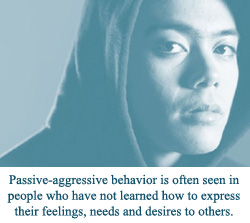Passive-Aggressive Behavior
People with passive-aggressive behaviors show hostility and aggression in
passive ways. Their aim is to resist job and social demands. Examples of
passive-aggressive behaviors are:
 |
“Forgetting” to do something on
purpose |
 |
Making a habit of putting off or being
late with social and/or job tasks |
 |
Failing to do one’s share of the work
or doing sub-standard work on purpose |
 |
Having a constant negative attitude |
 |
Criticizing authority figures, not
openly, but in subtle ways |
The goal of passive-aggressive behavior is to frustrate the wishes of
others and make others angry. This anger is most often directed at bosses,
roommates, spouses, parents, teachers, or anyone who has power or authority.
But, sometimes, people are not aware that their behavior is purposeful.
What leads to passive-aggressive behavior? Some researchers think that
these behaviors stem from certain childhood experiences. They believe that
parents who were aggressive and exercised complete control over their child
did not let the child express himself or herself. This may have pushed the
child into adopting passive-aggressive behavior patterns to cope. If, for
example, the child openly disagreed with the parent and was punished for
doing so, the child learned to substitute passive resistance for active
resistance.
A person who shows a lot of passive-aggressive behavior can have a
Passive-Aggressive Personality Disorder. A person
with this disorder:
 |
Is irritable, defensive, and resentful |
 |
Lacks self-confidence |
 |
Has a hard time getting pleasure from
relationships with others |
 |
Feels others are making unreasonable
demands on him or her, but thinks he or she is doing a better job
than what they are given credit for |
 |
Blames others for his or her problems |
 |
Is not aware that his or her
self-defeating behaviors are part of their personality |
Questions to Ask
Do you do four or more of the following and does this cause a
good deal of unhappiness and problems in your life?
- Passively resist doing routine social and work-related
tasks
- Complain that others do not understand or appreciate you
- Act sullen and argue with others
- Criticize and scorn authority figures (parents, spouse,
teachers, bosses, etc.) without reason
- Express envy and resentment toward persons better off
than you
- Exaggerate and complain a lot about your own problems
|
 |
|

|
|
|

|
|
Self-Help
 |
Take an assertiveness training
course – these are offered at many hospitals, colleges, high
schools, churches, and community education programs.
Assertiveness training can help you express your feelings in
the proper manner instead of using “hidden aggression.” |
 |
Stand back and try to look at
your problems in an objective way. Determine if your own
actions contribute to your problems, not the actions of
everyone else. |
 |
Confront your problems. Make
your needs, desires, and feelings known to others instead of
holding them in. Do this for one problem at a time. For
example, if you stall on doing a project:
- Break it down into smaller parts.
- Make a check list to complete each part and check
each item off as it is completed.
- Give yourself a meaningful reward with each item
checked off.
- Focus on pleasing yourself with each completed task,
not making someone else mad if the task is not done.
|
 |
Seek professional counseling
if Self-Help do not improve your problem. You may need the
help of a skilled therapist to help you get in touch with
the underlying anger and pain which causes you to act in a
passive-aggressive way. |
|
 |
What You Can Do for a Friend or Relative
 |
Learn to recognize the signs
of a Passive-Aggressive Personality Disorder. (See
bulleted items listed before
“Questions to Ask” above.) If you think that your friend or
relative may have this disorder, encourage them to see their
physician or counselor. Do so in a caring and assertive way.
Let the person’s physician know about your observations if
you are the person’s parent or spouse. |
 |
Encourage the person to take
an assertiveness training course or other course that
teaches effective ways to communicate. |
 |
Don’t make excuses for your
friend’s or relative’s behavior. Don’t do their work for
them or “bail them out” when they do not take care of their
own responsibilities. |
|
 |
|



